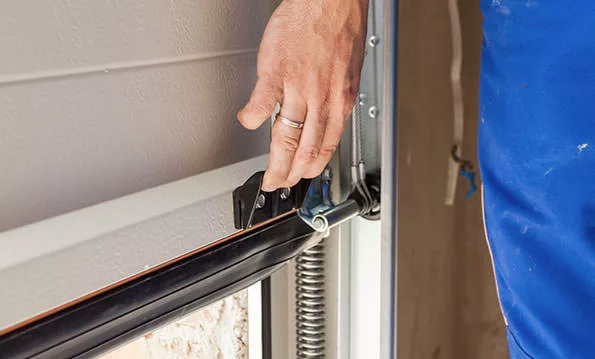Having a smoothly functioning garage door is essential for the convenience and security of your home. However, if you’ve been hearing a garage door makes clunking noise when opening, it’s important to address the issue promptly. In this troubleshooting guide, we will walk you through the steps to diagnose and fix the problem, restoring your garage door to its quiet operation.

Section 1: Understanding the Clunking Noise
When your garage door makes a clunking noise, it can be quite alarming. Typically, this noise occurs during the opening process and might resemble a loud, metallic thud. Identifying the source of the noise is crucial for effective troubleshooting. The clunking noise can be attributed to various causes, including loose components, worn-out parts, or improper alignment.
Section 2: DIY Inspection and Maintenance
Before diving into complex repairs, it’s a good idea to start with a visual inspection of your garage door system. Begin by examining the hardware, such as hinges, bolts, and tracks. Loose or worn-out hardware can contribute to the clunking noise. Tighten any loose screws or bolts and replace any damaged or worn-out parts.
To reduce the noise, lubricating the moving parts is essential. Apply a silicone-based lubricant to the rollers, springs, hinges, and tracks. This will help minimize friction and ensure smoother operation.
Section 3: Balancing and Alignment
Proper balance and alignment play a significant role in the quiet operation of your garage door. An imbalanced door can put strain on the opener and cause the clunking noise. To test the balance, disconnect the opener and manually open the door halfway. If the door stays in place, it is properly balanced. If not, you may need to adjust the tension of the springs.
Next, check the alignment of the tracks. Misaligned tracks can cause the rollers to jump and create the clunking noise. Inspect the tracks for any gaps or bends and gently tap them back into position using a rubber mallet.
Section 4: Addressing Worn-out Parts
Over time, certain parts of your garage door system may wear out and contribute to the clunking noise. Common culprits include springs, cables, and rollers. During your inspection, look for signs of damage or wear on these components.
If you notice any issues with the springs, such as visible gaps or excessive rust, it’s advisable to seek professional assistance. Replacing or repairing springs can be dangerous without the right knowledge and tools. Similarly, damaged cables or worn-out rollers should be addressed by a professional to ensure safe and proper functioning.
Section 5: Professional Help and Maintenance
While many garage door issues can be resolved through DIY efforts, some problems may require professional help. If you’re unsure about performing complex repairs or if the clunking noise persists after your initial troubleshooting, it’s best to contact a qualified technician. They have the expertise and experience to diagnose and fix the problem efficiently.
Additionally, regular maintenance by garage door professionals is crucial for the longevity and smooth operation of your garage door. They can perform inspections, identify potential issues early on, and provide necessary adjustments or lubrication.
Frequently Asked Questions
Q: What could be causing my garage door to make a clunking noise? A: The clunking noise can be caused by loose components, worn-out parts, or improper alignment within your garage door system.
Q: Can I fix the clunking noise myself, or do I need to call a professional? A: Simple maintenance tasks, such as tightening loose hardware and lubricating moving parts, can be done by homeowners. However, for complex repairs or if you’re unsure, it’s advisable to seek professional assistance.
Q: How often should I lubricate the garage door parts? A: It’s recommended to lubricate the moving parts of your garage door, such as rollers, springs, hinges, and tracks, at least once a year.
Q: Is it dangerous to continue using the garage door if it’s making a clunking noise? A: Continuing to use a garage door that’s making a clunking noise can potentially worsen the underlying problem. It’s best to address the issue promptly to ensure safe and reliable operation.
Q: What are the typical costs associated with repairing a garage door? A: The costs of repairing a garage door can vary depending on the specific issue and the extent of the repairs needed. It’s recommended to obtain quotes from reputable garage door professionals to get an accurate estimate.
By following these troubleshooting steps and seeking professional assistance when needed, you can resolve the clunking noise issue with your garage door, ensuring a smoother and quieter operation.



Leave a Reply